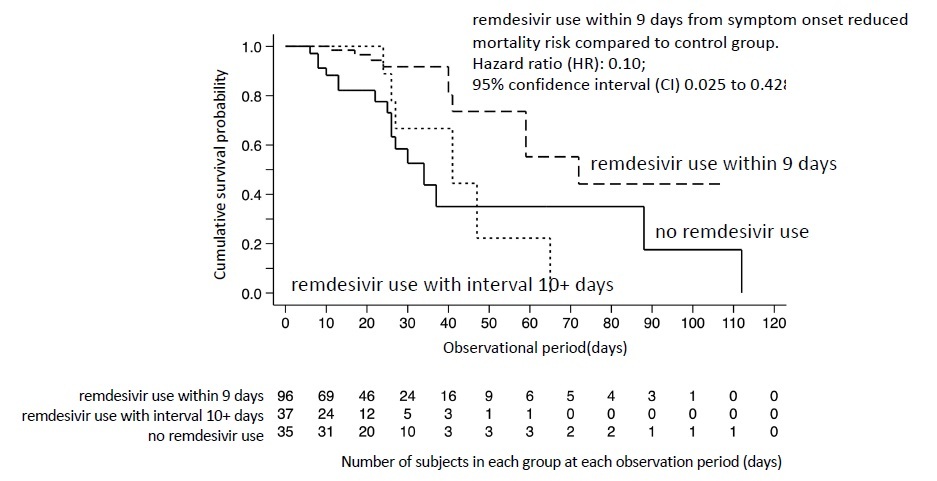Remdesivir reduces COVID-19 mortality in a real-world setting
October 5, 2022
Researchers from Tokyo Medical and Dental University (TMDU) find that treatment with remdesivir within 9 days of COVID-19 symptom onset decreases mortality in Asian patients also taking corticosteroids
Tokyo, Japan - The COVID-19 pandemic has led to an explosion of clinical research resulting in the development of a variety of vaccines and treatments, although the efficacy of some remains controversial. Now, researchers from Japan report that remdesivir, a drug whose effectiveness has been debated, appears to make a big difference in Japanese patients with COVID-19 who received corticosteroids in the ICU.
In a study published in September in the Journal of Medical Virology, researchers from Tokyo Medical and Dental University (TMDU) have revealed that remdesivir can reduce mortality in Asian patients if administered shortly after they begin showing COVID-19 symptoms.
Several studies have already shown that remdesivir can shorten recovery time in patients with COVID-19, although there are conflicting reports on whether the drug prevents patients from dying. In addition, previous trials did not focus on patients who required breathing support while in the ICU.
“Given the inconsistent evidence regarding the survival benefit it confers, we sought to investigate the effectiveness of remdesivir in patients with COVID-19, who were admitted to an ICU in Japan,” says Mariko Hanafusa, first author of the study. “All of these patients were being treated with corticosteroids for pneumonia, and some were receiving mechanical assistance for breathing.”
The researchers analyzed the medical records of 168 patients with COVID-19 admitted to the ICU at TMDU Hospital between April 2020 and November 2021. The patients were divided into groups based on whether or not they were also treated with remdesivir.
“The results showed a clear difference in patient survival based on when they received treatment with remdesivir,” states Takeo Fujiwara, senior author of the study. “In-hospital mortality rates were significantly lower in ICU patients who received remdesivir and corticosteroids within 9 days of symptom onset than in patients whose treatment with remdesivir started 10 or more days after they first developed symptoms.”
A small number of patients experienced adverse events such as a rash, requiring them to stop taking remdesivir, while a greater proportion experienced acute kidney injury or liver injury but were able to continue treatment.
“Our findings suggest that, at least in a largely Japanese patient population with severe to critical COVID-19, early treatment with remdesivir and corticosteroids is associated with decreased mortality,” says Hanafusa.
Given the survival benefit demonstrated in this study, the time that has elapsed since symptom onset should be considered when using remdesivir to treat patients who are critically ill with COVID-19. The varying effectiveness of remdesivir at different time points may reflect increasing viral load and lung damage over time, and could help explain why the effectiveness of this drug remains controversial.

Figure:Kaplan–Meier survival curves of patients with no remdesivir use, remdesivir use within 9 days, and remdesivir use with interval 10+ days.
###
The article, “Effectiveness of remdesivir with corticosteroids for COVID-19 patients in intensive care unit: A hospital-based observational study,” was published in the Journal of Medical Virology at DOI: 10.1002/jmv.28168.Summary
Researchers from Tokyo Medical and Dental University (TMDU) have found that administering remdesivir with corticosteroids to Asian patients who are critically ill with COVID-19 within 9 days of symptom onset reduces overall mortality. Starting treatment later did not have the same effect, suggesting that higher viral loads and serious lung damage impair the effectiveness of this treatment.
Journal Article
JOURNAL:Journal of Medical Virology
TITLE:Effectiveness of remdesivir with corticosteroids for COVID-19 patients in intensive care unit: A hospital-based observational study
DOI:https://doi.org/10.1002/jmv.28168
TITLE:Effectiveness of remdesivir with corticosteroids for COVID-19 patients in intensive care unit: A hospital-based observational study
DOI:https://doi.org/10.1002/jmv.28168
Correspondence to
Takeo Fujiwara,Ph.D.,Professor
Department of Global Health Promotion,
Graduate School of Medical and Dental Sciences,
Tokyo Medical and Dental University, (TMDU)
E-mail:fufujiwara.hlth(at)tmd.ac.jp
*Please change (at) in the e-mail addresses to @ when sending correspondence.

